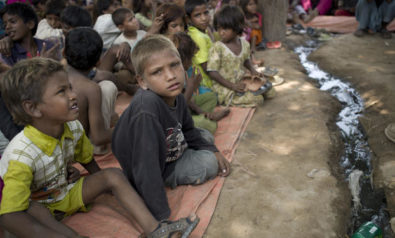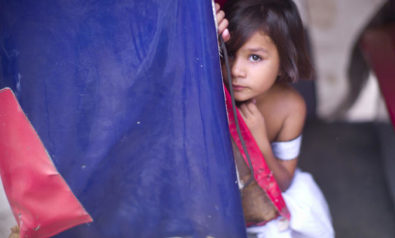Switching the spotlight: taking a deeper look at Pakistan's underreported issues.
Background
There is often a lack of range and depth in what is reported about Pakistan. Since the Afghanistan War, the media have remained fixated on covering terrorism and sectarian related events. No doubt, these conflicts need to be addressed but balance in reportage cannot be sacrificed. One-dimensional news coverage is dangerous because it leaves other important issues underreported or poorly covered, including the work of many civil society organizations, welfare networks, community groups, and NGOs.
In addition to terrorism and sectarian violence, there are many significant problems troubling Pakistan. A look at issues of poverty, education, and women’s rights — to name a few — may aid in helping develop a deeper understanding of Pakistan’s oft-reported conflicts.
Like Agha, one of the 1.5 million street children in Pakistan, 60 percent of Pakistanis survive on $2 a day. Sadly, these figures are not declining. The poverty rate has increased from 23.9 percent to 37.5 percent in the last three years.
Education has been given emergency status in Pakistan; the adult literacy rate is 55 percent. According to UNESCO, this ranks Pakistan at 113 out of 120 countries. Secondary school enrolment is at 35 percent. Though creating educational opportunities is important for its own sake, it may even serve as an antidote for other poisons plaguing the nation. Pakistan based research shows that an educated population practices greater religious tolerance and gender equality.
The recent election’s increase in female voters holds testament to Pakistani women's desire for political and social change. Officials face the challenge of increasing the 23 percent female labor participation rate, educational opportunities, and safe access to justice. Additionally, few educational opportunities exist for girls. Only 26 percent of elementary schools in Pakistan provide female education. In some areas, educating women is deemed unnecessary and is even prohibited due to misinformed religious beliefs held by community members. An increase in educational opportunities is necessary to improve the female labor participation rate and to push for women’s empowerment.
Pakistan’s ability to survive the multiple crises it faces owes much to the resilience of its people and their determination.
In 1947, new institutions like the Edhi Foundation were made. What began as one man in a van providing medical aid to the poor has now grown into hundreds of hospitals and a fleet of ground and air ambulances. It is an example that has inspired many others, with civil society and welfare groups aiming to fill huge gaps left by the inadequacy of state institutions and infrastructure.
Why are Pakistan’s Underreported Problems Relevant?
Indeed, change does not happen overnight. It is crucial, however, that the problems at hand are recognized and addressed so as to pave a path for progress. An understanding of Pakistan’s history, culture, and traditions is imperative to promote national unity and deflate sectarian tensions.
For this reason, the Royal Society for the Encouragement of Arts, Manufactures and Commerce (RSA) and The Samosa launched Pakistan Calling, a film project to promote cross-cultural dialogue between Britain and Pakistan. Having launched in April 2013, the films depict Pakistani civil society organizations and individuals attempting to tackle the country's many problems, as well as explore Pakistan’s many links with Britain.
*[Note: Pakistan Calling is a team effort by British Pakistanis, universities in Pakistan, the London Metropolitan University, and the RSA, who together set up Pakistan Calling, to increase awareness and support for Pakistani civil society organizations and activists.]
Image: Copyright © Shutterstock. All Rights Reserved
For more than 10 years, Fair Observer has been free, fair and independent. No billionaire owns us, no advertisers control us. We are a reader-supported nonprofit. Unlike many other publications, we keep our content free for readers regardless of where they live or whether they can afford to pay. We have no paywalls and no ads.
In the post-truth era of fake news, echo chambers and filter bubbles, we publish a plurality of perspectives from around the world. Anyone can publish with us, but everyone goes through a rigorous editorial process. So, you get fact-checked, well-reasoned content instead of noise.
We publish 2,500+ voices from 90+ countries. We also conduct education and training programs on subjects ranging from digital media and journalism to writing and critical thinking. This doesn’t come cheap. Servers, editors, trainers and web developers cost money.
Please consider supporting us on a regular basis as a recurring donor or a sustaining member.
Support Fair Observer
We rely on your support for our independence, diversity and quality.
Will you support FO’s journalism?
We rely on your support for our independence, diversity and quality.







